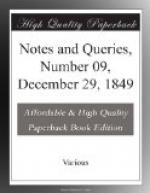“Here Love himself
sits smiling:
Just such another wanton Ganymede
Set Jove afire with,” &c.
One editor proposed to amend this by inserting the normative “he” after “Ganymede;” and another by omitting “with” after “afire.” Mr. Dyce saw that both these must be wrong, as a comparison between two wanton Ganymedes, one of which sat in the coutenance of Arcite, could never have been intended;—another, something, if not Ganymede, was wanted, and he, therefore, has this note:—“The construction and meaning are, ’With just such another smile (which is understood from the preceding ‘smiling’) wanton Ganymede set Jove afire.” When there is a choice of nouns to make intelligible sense, how can that one be understood which is not expressed? It might be “with just such another Love;” but, as I shall shortly show, no conjecture on the subject is needed. The older editors were so fond of mending passages, that they did not take ordinary pains to understand them; and in this instance they have been so successful in sticking the epithet “wanton” to Ganymede, that even Mr. Dyce, with his clear sight, did not see that the very word he wanted was the next word before him. It puts one in mind of a man looking for his spectacles who has them already across his nose. “Wanton” is a noun as well as an adjective; and, to prevent it from being mistaken for an epithet applied to Ganymede, it will in future be necessary to place after it a comma, when the passage will read thus:—
“Here Love himself
sits smiling.
Just such another wanton,” (as the
aforesaid smiling Love) “Ganymede
Set Jove afire with,” &c.
The third act of the same play commences thus:—
“The duke has lost Hippolita; each
took
A several land.”
Mr. Dyce suspects that for “land” we should read “laund,” an old form of lawn. “Land” being either wrong, or having a sense not understood now, we must fall back on the general sense of the passage. When people go a hunting, and don’t keep together, it is very probable that they may take a several “direction.” Now hand means “direction,” as we say “to the right” or “left hand.” It is not, therefore, probable, that we should read “a several hand?”
SAMUEL HICKSON
* * * * *
“GOTHIC” ARCHITECTURE
It would require more space than you could allot to the subject, to explain, at much length, “the origin, as well as the date, of the introduction of the term ‘Gothic,’ as applied to pointed styles of ecclesiastical architecture,” required by R. Vincent, of Winchester, in your Fourth Number. There can be no doubt that the term was used at first contemptuously, and in derision, by those who were ambitious to imitate and revive the Grecian orders of architecture, after the revival of classical literature. But, without citing many




